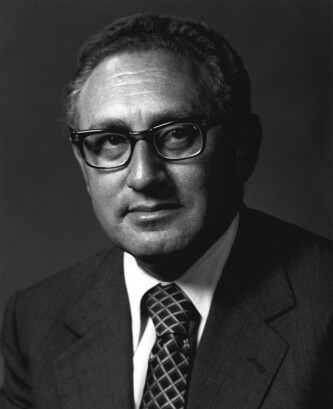Henry Kissinger, a prominent diplomat and political figure, passed away at the age of 100 at his home in Connecticut. Throughout his career, Kissinger was both praised and criticized for his approach to foreign relations. He was known for his commitment to realism, which involved pursuing policies that served the national interest of the United States. This approach led to the thawing of relations with the Soviet Union and China, as well as the resolution of conflicts such as the Arab-Israeli conflict and the Vietnam War. However, his critics accused him of supporting immoral actions, such as the coup in Chile and the Argentinean military’s “dirty war.”
Kissinger’s life began in Germany, where he was born into a middle-class Jewish family. Fleeing Nazi persecution, his family immigrated to the United States in 1938. Despite facing challenges as a shy teenager with a heavy accent, Kissinger excelled academically and eventually became involved in military intelligence during World War II. After the war, he pursued higher education and rose through the ranks in academia.
Kissinger’s career took off when he published a book on nuclear war and foreign policy, which gained him recognition and led to his appointment as national security advisor under President Richard Nixon. During this time, he played a crucial role in improving relations with the Soviet Union and China, leading to Nixon’s historic visit to China in 1972. However, Kissinger’s involvement in the Vietnam War and his controversial actions in Cambodia drew criticism and protests.
Despite the controversies surrounding his career, Kissinger continued to be influential in the political sphere. He advised subsequent presidents and remained active in shaping foreign policy. His views on issues such as the Middle East and Russia’s occupation of Crimea have been sought after by world leaders. Kissinger’s legacy is one of power and influence, with his unapologetic pursuit of US interests and defense of the country’s way of life. He once famously said, “A country that demands moral perfection in its foreign policy will achieve neither perfection nor security.”
Original news source: Henry Kissinger: Divisive diplomat who towered over world affairs (BBC)
Listen
Slow
Normal
Fast
Group or Classroom Activities
Warm-up Activities:
– News Summary
Instructions: Have students work in pairs or small groups. Ask them to read the article individually and then summarize the key points in a news article format. They should include the most important information, such as Kissinger’s background, career highlights, controversies, and his impact on US foreign policy. Each group can then present their news summary to the class.
– Opinion Poll
Instructions: Divide the class into two groups. One group will take the role of Kissinger’s supporters, while the other group will take the role of his critics. Give each group time to discuss and prepare their arguments. Then, have a debate where each side presents their opinions and evidence to support their stance. After the debate, conduct an opinion poll where each student votes for either the supporters or the critics based on the arguments presented.
– Word Association
Instructions: Provide each student with a piece of paper and a pen. Choose key words from the article, such as “realism,” “thawing of relations,” “Vietnam War,” and “Middle East.” Instruct the students to write down the first word that comes to their mind when they see each keyword. After a few minutes, have the students share their word associations with a partner or in small groups. Encourage them to explain why they made those associations.
– Sketch It
Instructions: Divide the class into pairs. Assign each pair a specific event or aspect of Kissinger’s career mentioned in the article, such as the Arab-Israeli conflict or the coup in Chile. Instruct the pairs to create a sketch or drawing that represents their assigned topic. They should include key elements and symbols that are relevant to the event or aspect. After a given time, ask each pair to present their sketch to the class and explain their artistic choices.
– Future Predictions
Instructions: Instruct the students to imagine that they are foreign policy experts who have been asked to predict the future of US foreign relations. Ask them to consider the impact of Kissinger’s approach to foreign policy and how it might shape future events. Have students write a short paragraph or give a brief presentation outlining their predictions. Encourage them to support their predictions with logical reasoning and evidence from the article. Afterward, facilitate a class discussion where students can share and compare their predictions.
Comprehension Questions:
1. What was Henry Kissinger known for in his approach to foreign relations?
2. What were some of the conflicts that Kissinger helped resolve during his career?
3. How did Kissinger’s family come to the United States?
4. What role did Kissinger play during World War II?
5. How did Kissinger’s career take off?
6. What were some of the controversies surrounding Kissinger’s actions during the Vietnam War?
7. How did Kissinger continue to be influential in the political sphere after his time as national security advisor?
8. What is Kissinger’s legacy in terms of his pursuit of US interests and defense of the country’s way of life?
Go to answers ⇩
Listen and Fill in the Gaps:
Henry Kissinger, a prominent diplomat and political figure, passed away at the age of 100 at his home in Connecticut. Throughout his career, Kissinger was both (1)______ and criticized for his approach to foreign relations. He was known for his commitment to realism, which involved pursuing (2)______ that served the national interest of the United States. This approach led to the (3)______ of relations with the Soviet Union and China, as well as the (4)______ of conflicts such as the Arab-Israeli conflict and the Vietnam War. However, his critics accused him of supporting immoral actions, such as the coup in Chile and the Argentinean (5)______’s “dirty war.”
(6)______’s life began in Germany, where he was born into a middle-class Jewish family. Fleeing Nazi persecution, his family immigrated to the United States in 1938. Despite facing challenges as a shy teenager with a (7)______ accent, Kissinger excelled academically and eventually (8)______ involved in military intelligence during World War II. After the war, he pursued higher education and rose through the ranks in academia.
Kissinger’s career took off when he published a book on nuclear war and foreign policy, which (9)______ him recognition and led to his appointment as national security advisor under President Richard Nixon. During this time, he played a (10)______ role in improving (11)______ with the Soviet Union and China, leading to Nixon’s historic visit to China in 1972. However, Kissinger’s involvement in the Vietnam War and his (12)______ actions in Cambodia drew criticism and protests.
Despite the controversies surrounding his career, Kissinger continued to be influential in the political sphere. He advised subsequent presidents and remained active in shaping foreign policy. His views on issues such as the Middle East and Russia’s (13)______ of (14)______ have been sought after by world leaders. Kissinger’s legacy is one of power and influence, with his unapologetic pursuit of US interests and defense of the (15)______’s way of life. He once famously said, “A country that (16)______ moral perfection in its foreign policy will achieve neither perfection nor security.”
Go to answers ⇩
Discussion Questions:
Students can ask a partner these questions, or discuss them as a group.
1. What is the significance of Henry Kissinger’s approach to foreign relations?
2. How would you feel if you were forced to flee your home country due to persecution?
3. Do you think Kissinger’s approach to foreign relations was effective in achieving US national interests? Why or why not?
4. What is your opinion on Kissinger’s involvement in the coup in Chile and the “dirty war” in Argentina?
5. How do you think Kissinger’s background as a middle-class Jewish immigrant influenced his career?
6. Do you believe Kissinger’s actions in the Vietnam War were justified? Why or why not?
7. What do you think about Kissinger’s statement that a country cannot achieve moral perfection in its foreign policy?
8. How would you describe Kissinger’s legacy in the political sphere?
9. Do you agree with Kissinger’s commitment to pursuing policies that serve the national interest of the United States? Why or why not?
10. What do you think about Kissinger’s role in improving relations with the Soviet Union and China?
11. How do you think Kissinger’s academic background contributed to his career in politics?
12. What is your opinion on Kissinger’s advice to subsequent presidents and his influence on shaping foreign policy?
13. How do you feel about Kissinger’s views on issues such as the Middle East and Russia’s occupation of Crimea?
14. Do you think Kissinger’s unapologetic pursuit of US interests was beneficial or detrimental to global relations? Why or why not?
15. How would you describe Kissinger’s overall impact on the world stage?
Individual Activities
Vocabulary Meanings:
Match each word to its meaning.
Words:
1. diplomat
2. realism
3. Soviet Union
4. China
5. Arab-Israeli conflict
6. Vietnam War
7. Germany
8. Chile
Meanings:
(a) A country in South America known for its wine
(b) A political approach based on practicality and practical considerations
(c) A long-standing dispute between Arab and Israeli nations
(d) A war fought between North and South Vietnam
(e) A country that was a major world power during the Cold War
(f) A person who represents their country abroad
(g) A country that has the largest population in the world
(h) A country in Europe known for its engineering and beer
Go to answers ⇩
Multiple Choice Questions:
1. What was Henry Kissinger known for in his approach to foreign relations?
(a) Idealism
(b) Pacifism
(c) Realism
(d) Isolationism
2. Where was Henry Kissinger born?
(a) United States
(b) Russia
(c) China
(d) Germany
3. What conflict did Henry Kissinger help resolve?
(a) Korean War
(b) Arab-Israeli conflict
(c) Cold War
(d) World War II
4. What role did Henry Kissinger play under President Richard Nixon?
(a) National security advisor
(b) Secretary of State
(c) Vice President
(d) Chief of Staff
5. What controversial actions did Henry Kissinger take in Cambodia?
(a) Supported the Argentinean military’s “dirty war”
(b) Involved in the Vietnam War
(c) None of the above
(d) Supported the coup in Chile
6. What did Henry Kissinger advise subsequent presidents on?
(a) Russia’s occupation of Crimea
(b) Middle East issues
(c) Both (a) and (b)
(d) Neither (a) nor (b)
7. What is Henry Kissinger’s legacy?
(a) Pacifism and idealism
(b) Controversy and criticism
(c) Power and influence
(d) Isolationism and neutrality
8. What did Henry Kissinger famously say about foreign policy?
(a) “A country that demands moral perfection in its foreign policy will achieve neither perfection nor security.”
(b) “Foreign policy should prioritize peace above all else.”
(c) “The United States should not interfere in the affairs of other countries.”
(d) “Diplomacy is the key to resolving all conflicts.”
Go to answers ⇩
True or False Questions:
1. Henry Kissinger passed away at the age of 100 at his home in Connecticut.
2. His approach led to the thawing of relations with the Soviet Union and China.
3. Kissinger was born into a wealthy Christian family in Germany and fled Nazi persecution.
4. He struggled academically and became involved in military intelligence during World War II.
5. Critics accused Kissinger of supporting immoral actions, such as the coup in Chile and the Argentinean military’s “dirty war.”
6. Kissinger was known for his commitment to realism in foreign relations.
7. Kissinger played no role in resolving conflicts such as the Arab-Israeli conflict and the Vietnam War.
8. Kissinger’s career stalled when he published a book on nuclear war and foreign policy, leading to his dismissal as national security advisor under President Richard Nixon.
Go to answers ⇩
Write a Summary:
Write a summary of this news article in two sentences.
Check your writing now with the best free AI for English writing!
Writing Questions:
Answer the following questions. Write as much as you can for each answer.
Check your answers with our free English writing assistant!
1. What approach did Henry Kissinger take to foreign relations?
2. What were some of the conflicts that Kissinger helped resolve?
3. Where was Kissinger born and why did his family immigrate to the United States?
4. How did Kissinger’s career take off and what role did he play in improving relations with the Soviet Union and China?
5. Despite controversy, how did Kissinger continue to be influential in the political sphere?
Answers
Comprehension Question Answers:
1. What was Henry Kissinger known for in his approach to foreign relations?
Kissinger was known for his commitment to realism, which involved pursuing policies that served the national interest of the United States.
2. What were some of the conflicts that Kissinger helped resolve during his career?
Kissinger helped resolve conflicts such as the Arab-Israeli conflict and the Vietnam War.
3. How did Kissinger’s family come to the United States?
Kissinger’s family fled Nazi persecution in Germany and immigrated to the United States in 1938.
4. What role did Kissinger play during World War II?
During World War II, Kissinger was involved in military intelligence.
5. How did Kissinger’s career take off?
Kissinger’s career took off when he published a book on nuclear war and foreign policy, which gained him recognition and led to his appointment as national security advisor under President Richard Nixon.
6. What were some of the controversies surrounding Kissinger’s actions during the Vietnam War?
Kissinger’s involvement in the Vietnam War and his controversial actions in Cambodia drew criticism and protests.
7. How did Kissinger continue to be influential in the political sphere after his time as national security advisor?
Kissinger advised subsequent presidents and remained active in shaping foreign policy.
8. What is Kissinger’s legacy in terms of his pursuit of US interests and defense of the country’s way of life?
Kissinger’s legacy is one of power and influence, with his unapologetic pursuit of US interests and defense of the country’s way of life.
Go back to questions ⇧
Listen and Fill in the Gaps Answers:
(1) praised
(2) policies
(3) thawing
(4) resolution
(5) military
(6) Kissinger
(7) heavy
(8) became
(9) gained
(10) crucial
(11) relations
(12) controversial
(13) occupation
(14) Crimea
(15) country
(16) demands
Go back to questions ⇧
Vocabulary Meanings Answers:
1. diplomat
Answer: (f) A person who represents their country abroad
2. realism
Answer: (b) A political approach based on practicality and practical considerations
3. Soviet Union
Answer: (e) A country that was a major world power during the Cold War
4. China
Answer: (g) A country that has the largest population in the world
5. Arab-Israeli conflict
Answer: (c) A long-standing dispute between Arab and Israeli nations
6. Vietnam War
Answer: (d) A war fought between North and South Vietnam
7. Germany
Answer: (h) A country in Europe known for its engineering and beer
8. Chile
Answer: (a) A country in South America known for its wine
Go back to questions ⇧
Multiple Choice Answers:
1. What was Henry Kissinger known for in his approach to foreign relations?
Answer: (c) Realism
2. Where was Henry Kissinger born?
Answer: (d) Germany
3. What conflict did Henry Kissinger help resolve?
Answer: (b) Arab-Israeli conflict
4. What role did Henry Kissinger play under President Richard Nixon?
Answer: (a) National security advisor
5. What controversial actions did Henry Kissinger take in Cambodia?
Answer: (d) Supported the coup in Chile
6. What did Henry Kissinger advise subsequent presidents on?
Answer: (b) Middle East issues
7. What is Henry Kissinger’s legacy?
Answer: (c) Power and influence
8. What did Henry Kissinger famously say about foreign policy?
Answer: (a) “A country that demands moral perfection in its foreign policy will achieve neither perfection nor security.”
Go back to questions ⇧
True or False Answers:
1. Henry Kissinger passed away at the age of 100 at his home in Connecticut. (Answer: True)
2. His approach led to the thawing of relations with the Soviet Union and China. (Answer: True)
3. Kissinger was born into a wealthy Christian family in Germany and fled Nazi persecution. (Answer: False)
4. He struggled academically and became involved in military intelligence during World War II. (Answer: False)
5. Critics accused Kissinger of supporting immoral actions, such as the coup in Chile and the Argentinean military’s “dirty war.” (Answer: True)
6. Kissinger was known for his commitment to realism in foreign relations. (Answer: True)
7. Kissinger played no role in resolving conflicts such as the Arab-Israeli conflict and the Vietnam War. (Answer: False)
8. Kissinger’s career stalled when he published a book on nuclear war and foreign policy, leading to his dismissal as national security advisor under President Richard Nixon. (Answer: False)
Go back to questions ⇧















